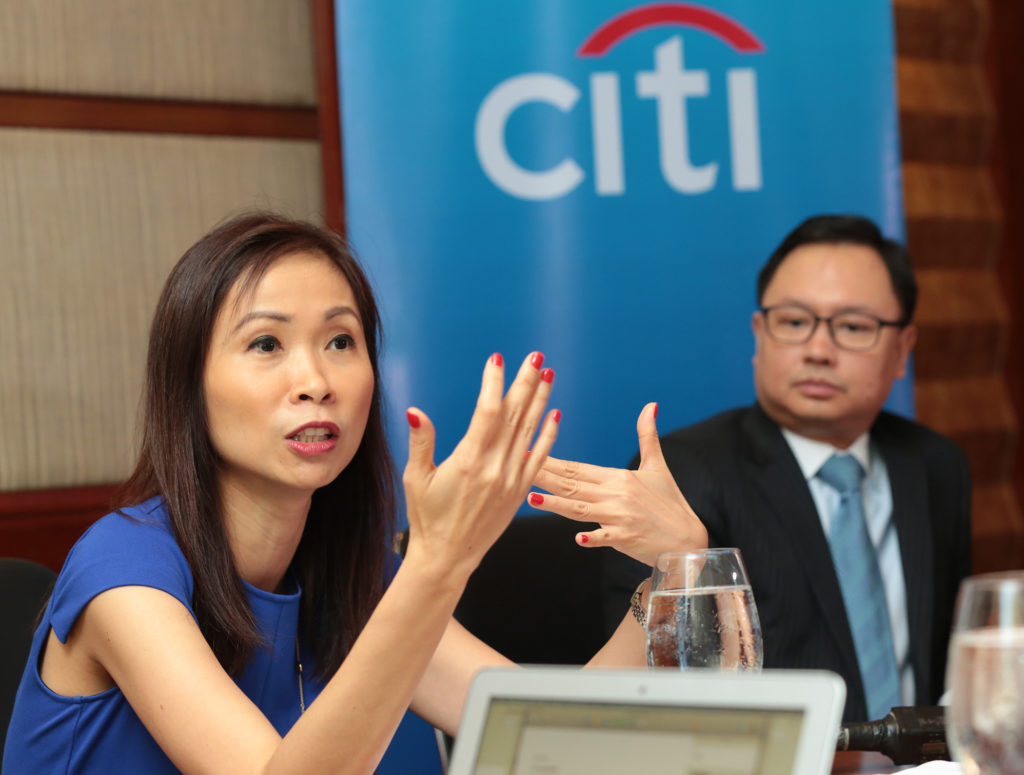
Citi Asia-Pacific economist Johanna China with Citi Philippines treasurer Paul Favila
The inflation-targeting Bangko Sentral ng Pilipinas may raise key interest rates by as much as 100 basis points next year to curb pressures from higher oil prices, further US interest rate increases and resilient domestic demand, Citi’s chief regional economist said.
Hong Kong-based Filipina economist Johanna Chua, who heads Citi’s Asia-Pacific research team, said in a briefing on Friday that the BSP might raise key policy rates in 2018 by three to four times next year or by as much as 100 basis points to 4 percent.
This is in line with Citi’s expectations of a “pretty decent” gross domestic product (GDP) growth rate of 6.5 percent this year and 6.6 percent next year for the Philippines.
However, Citi sees the country’s current account to be a bit vulnerable this year, incurring a deficit of $2.3 billion or 0.7 percent of GDP. This is seen to narrow to $1.1 billion or 0.4 percent of GDP next year.
The current account deficit projection of Citi is larger than the $600-million deficit forecast of the BSP for this year.
The BSP sees a shift in the current account position from a surplus of $600 million last year to a $600-million deficit this year based on the expected 10-percent growth in imports against a 5-percent growth in exports.
“To me this is not a cause for concern,” Chua said, noting that the Philippines was transitioning from an economy that had built up a lot of foreign reserves and current surpluses in the past to one that was starting to import more capital goods. For as long as more import spending goes to productive activities than consumerist binge, such a deficit would be manageable.
Chua said this natural adjustment mechanism would continue to weigh down the peso, which Citi expects to trade at 51.1 to $1 in the next six to 12 months.
The economist also expects the BSP to hike interest rates next year in view of Citi’s more-hawkish-than-consensus view on US Federal Reserve and the projected upswing in global oil prices, the Philippines being a net oil importer.
Citi expects the US Fed to hike targeted rates one more time this year in December and by three times more next year.
Oil price based on Brent crude is seen averaging this year at $54 per barrel, hitting as much as $58 per barrel in the fourth quarter. Next year, Citi sees Brent crude hovering between $52 and $55 per barrel. On Friday, spot price was at about $52 per barrel.
If oil prices will turn out more benign than Citi’s outlook, Chua said this would translate to lower inflation than originally expected. This year, Citi expects inflation rate to average 3.1 percent, rising to 3.4 percent next year versus the BSP’s inflation target range of 2-4 percent.
“What’s really important for the Philippines is getting the fiscal traction,” Chua said.
“We are optimistic about tax reform this year. We think it will pass before the end of the year. If there’s some sort of dilution from the DOF (Department of Finance) version, as long as revenue can still incrementally gain, that will still provide fiscal buffer in spending for the government.”